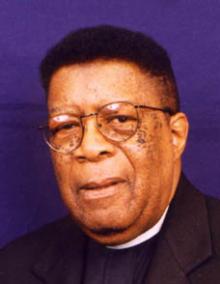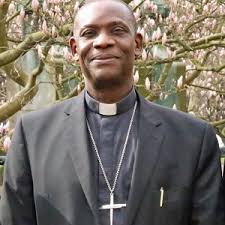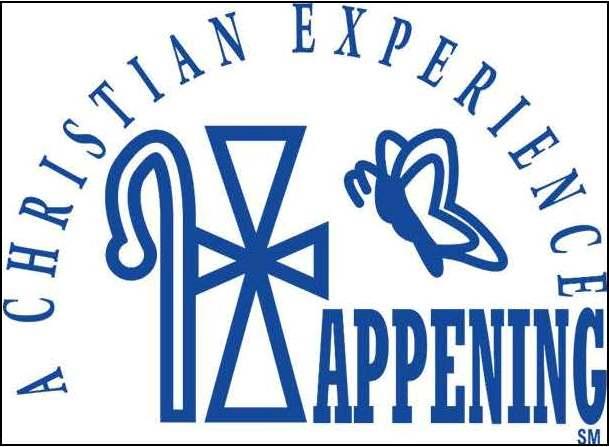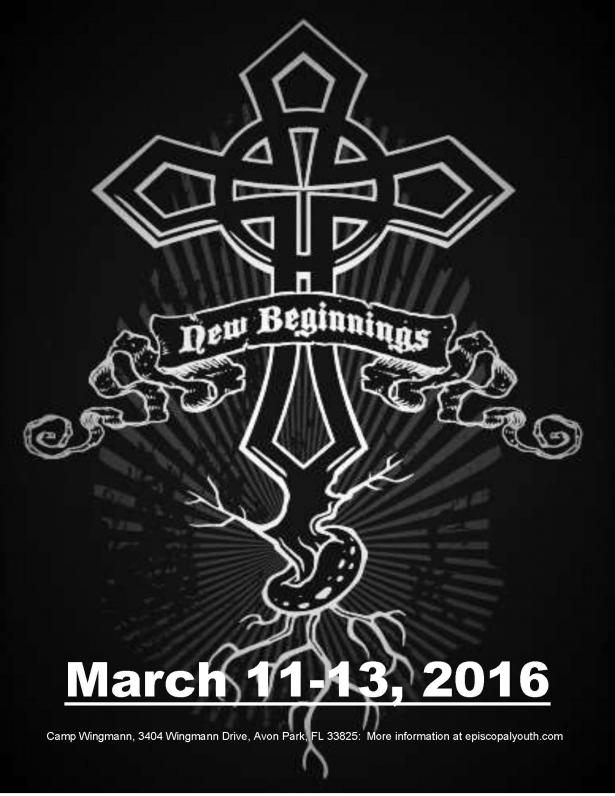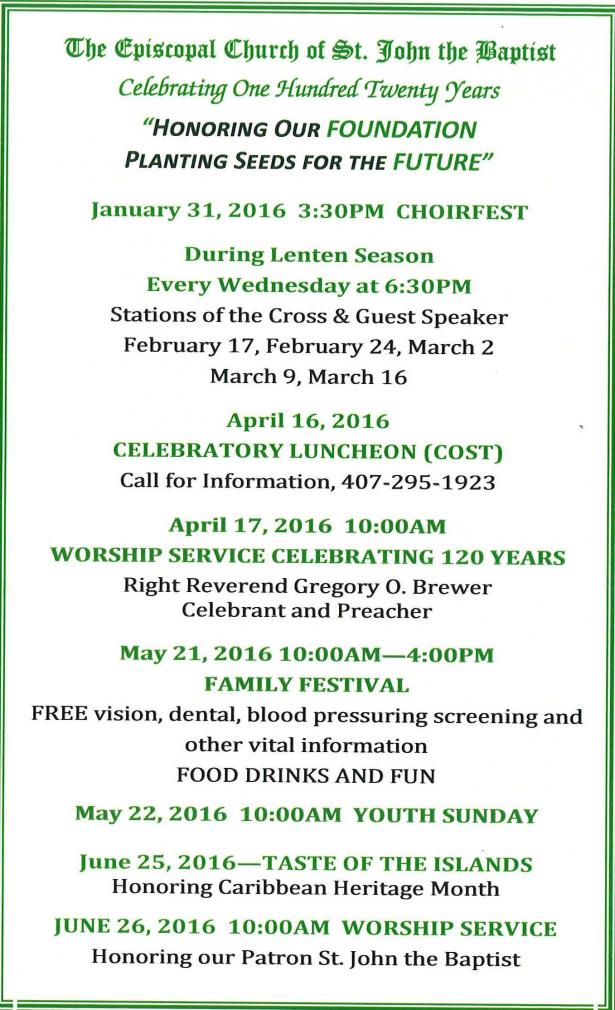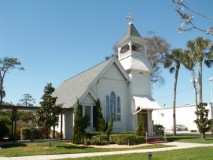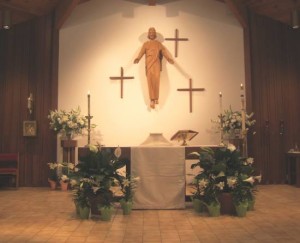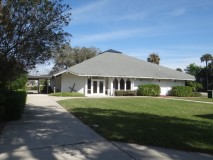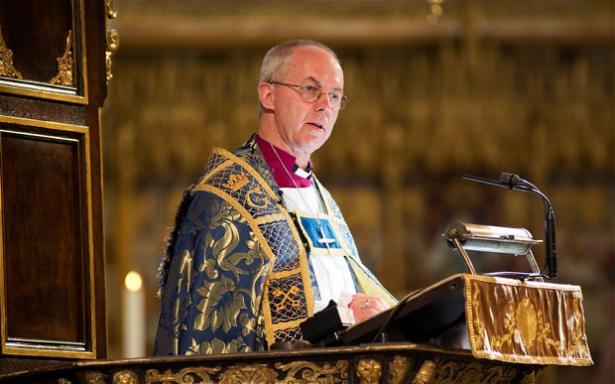
The Archbishop of Canterbury, Justin Welby’s address at the Primates meeting in Canterbury, Monday, January 11, 2016.
“When it was evening on that day, the first day of the week, and the doors of the house where the disciples had met were locked for fear of the Jews, Jesus came and stood among them and said, “Peace be with you.” After he said this, he showed them his hands and his side. Then the disciples rejoiced when they saw the Lord. Jesus said to them again, “Peace be with you. As the Father has sent me, so I send you.”
All Christians, but most especially Bishops, in the succession to the Apostles, are people who are sent. We are not our own masters, but we serve another, the Lord Jesus Christ.
We do not choose our actions, but we have a mission, the missio dei, to proclaim the good news of the Kingdom of God, to make disciples, to know “nothing except Jesus Christ and Him crucified”.
We do not have our own resources, but we are filled by the Holy Spirit, as the qualification for our actions.
We are not principally impelled by duty, or reason, or power, but “the love of Christ urges us on”
There have always been tensions. The first Lambeth Conference, boycotted by the Archbishop of York and many English Bishops, was over a question of heresy. Divorce, contraception, the ordination of women, all caused deep fractures, and were seen as doctrinal, not only moral, issues.
The reality is that a Church such as the Anglican Communion is such a mixture of histories, and of theological difference, that inevitably there will be deep differences and from time to time these will lead to grave crises, such as the one faced in recent years.
Like all crises in the church it is complicated. It springs from history, the history of centuries a history of Anglicanism and of the church in England which began before the fall of the Roman Empire and long before Augustine, with Bishops, including at York.
Since Augustine, the history is a mixture of good and bad,of the heroism of missionary endeavour from Augustine onwards, through the evangelism of the savage tribes of Scandinavia by monks from the north east of England, and onwards over the centuries to the great missions from the 18th century which led to so many of the churches whose Primates are here. We are all the heirs and beneficiaries of courage, of loss, of suffering and of martyrdom, of wars of independence and conquest, of the search for freedom and of others who have used the church for repression. They all shaped the way we think and feel, and our history influences how we deal with crises.
As I say that history contains much sin. Often faith was the servant of Empire, and carried in its baggage racism, oppression, contempt for those they met. We need only think of Ajayi Crowder to see the arrogance that existed. We need only look at the church colluding with the abuse of indigenous peoples to feel shame.
Yet, through it all, God was faithful. For example, East Africa was evangelised, it is true, first by missionaries, but it was the East African Revival that set the pattern for holiness, for a vigour of lifestyle in relationship with Christ that so impressed an 18 year old teaching at Kiburu Secondary school. That same 18 year old then had the seed of the gospel sown into the ground prepared, when three Ugandan Bishops, led by Festo Kivengere came to England in 1975. And a few weeks later I gave my life to Christ. So for me it was indigenous Kenyan and Ugandan faith, through the Revival’s legacy, that brought me salvation. I do not forget that.
Not only East Africa, but so many other places were first evangelised in ways both good and sinful, and then grew on in their own way under God into what they are today. Reading the history of the Anglicans in the 20th century, through the records of the Lambeth Conferences, ACCs and Primates’ meetings, one sees the faithfulness of God through world war, economic crisis, civil and international conflicts, persecution and deep changes in cultural context. But no change in God Himself.
All that history, which is the story of the faithfulness of God equipping by grace a fallible church brings us to today.
First, as to the global Church. It is over 1,000 years since the Great Schism fully separated Western and Eastern churches, and despite the Council of Florence in 1445, and a very temporary reunification, the divides and wounds in the body of Christ deepened greatly 500 years ago.
We so easily take our divisions as normal, but they are in fact an obscenity, a denial of Christ’s call and equipping of the church. If we exist to point people to Christ, as was done for me, our pointing is deeply damaged by division. Every Lambeth Conference of the 20th century spoke of the wounds in the body of Christ. Yet some say, it does not matter, God sees the truth of spiritual unity and the church globally still grows. Well, it does for the moment, but the world does not see the spiritual church but a divided and wounded body. Jesus said to his disciples, “as the Father sent me so send I you”. That sending is in perfect unity, which is why even at Corinth and at the Council of Jerusalem, we find that truth must be found together rather than show a divided Christ to the world.
If we look more around the Anglican world we see much health and much reason for concern. In the churches represented in this room, there are a high proportion, perhaps half who are deeply affected by conflict, persecution or both. Others are suffering from extremes of poverty and injustice, and others from climate change.
In some parts of the Communion decline in numbers has been a pattern for many years. In England our numbers have been falling at about 1% every year since WWII. This week will see the publication of the figures for 2014, continuing that pattern, made to look a little worse by a change in the way we count people. The culture has becoming anti-Christian, whether it is on matters of sexual morality, or the care for people at the beginning or the end of life. It is easy to paint a very gloomy picture.
We can also paint a gloomy picture of the moral and spiritual state of Anglicanism. In all Provinces there are forms of corruption, none of us is without sin. There is litigation, the use of civil courts for church matters in some places. Sexual morality divides us over same sex issues, where we are seen as either compromising or homophobic. The list can go on and on. The East African Revival teaches us the need for holiness. We must be renewed as a holy church, defined by our passionate worship and its content, with every Christian knowing scripture, prayerful, humble and evangelistic. In a sentence, we must be those who are, to the outside world, visibly disciples of Jesus Christ.
For all that there is much good news. First, Jesus did not come to a group of well-established disciples and send them, but to failures, who had fled, denied, abandoned. Paul in the letters to Corinth does not write to a well-functioning church of good disciples, but to those who were divided, immoral, filled with rivalry and hatred. We are a Jesus centred people, and we serve the God who raised Jesus from the dead and raises us. At the heart of the life of the church is not power, or structure, or authority, but the person of Jesus Christ, present by His Spirit, whose plans for good, whose love for the lost is our calling and our urging.
We see good news as well as knowing good news. Around the world the church is growing, evangelising, leading people to life in Christ, without whom there is no true life. The Anglican churches are everywhere caring for the sick, educating children, influencing society, and most normally of all, in bringing people to reconciliation with God in Christ, the only decisive reconciliation, they are also bringing reconciliation in society. In so many places, especially at the local level, by the grace of God alone, Anglicanism is a church of the Beatitudes.
In this country many talk of the post Christian society, but the C of E educate more than 1,000,000 children in our schools. We are involved in almost all the food banks as, for the first time since the 1930s, we have hunger in this country. We are still a major part of the glue that holds society together. A recent attempt to introduce assisted suicide was crushingly defeated in Parliament. We are exempted from the same sex marriage act, showing that our vioice is still heard against the prevailing wind of our society, and at much cost to ourselves, by the way. The Church of England is still a primary source of leadership for communities, to the dismay of the secularists. It is a struggle, but we are not losing. And we are also in the middle of the biggest reform of the church since the mid 19th century. We are planting churches. The ABY is on an evangelistic pilgrimage, I imagine the first ABY to do that in centuries, even perhaps over 1,000 years. And the Bench of Bishops is described by the longer standing members as the most orthodox since WWII.
Around the world it is Anglicans who serve Christ in every possible way, supporting one another in bringing peace, in defending the oppressed, in education and health, and who are active in evangelism, bringing salvation to the lost. Diocesan partnerships are often strong, and mutually beneficial. We must not despair, because for all our faults God is at work by His Spirit, and we are in the end those who are sent by Jesus as the Father sent Him.
Finally, let us look at the world around us. It is one in which God, the Holy Trinity, calls the Church to action. Religious war is spreading, and the secular world has no answer to it, does not even understand the nature of religion. Climate change is a huge danger. New powers are emerging rapidly such as China and India, the former with a large church that is seeking to be part of world Christianity. India needs the truth of Christ, more so as wealth and poverty become more extreme. Between them those two great countries have a third of the world’s people. Are we supporting their churches in preaching ? How do we respond?
Islam is engaged in more and more violent activity in its civil war. Its violent arms subvert, attack, kill and destroy without mercy or conscience, as Christians did during the reformation. Islam’s mainstream leaders, at peace but much menaced, look for friends, how do we respond?
Many parts of the world represented here are suffering terribly from climate change, are literally drowning. Where is the Anglican voice?
In some areas oppressive government clings to power, provoking killing that threatens life itself. Are we in active support in united strength?
All of us here need a body that is mutually supportive, that loves one another, that stoops to lift the fallen and kneels to bind the wounds of the injured. Without each other we are deeply weakened, because we have a mission that is only sustainable when we conform to the image of Christ, which is first to love one another. The idea is often put forward that truth and unity are in conflict, or in tension. That is not true. Disunity presents to the world an untrue image of Jesus Christ. Lack of truth corrodes and destroys unity. They are bound together, but the binding is love. In a world of war, of rapid communications, of instant hearing and misunderstanding where the response is only hatred and separation, the Holy Spirit whose creative and sustaining gifting of the church is done in diversity, demands that diversity of history, culture, gift, vision be expressed in a unity of love. That is what a Spirit filled church looks like.
So with all our grave difficulties we face a world in darkness, lostness and suffering, knowing that we serve Jesus who sends us and that those whom he sends he equips. Our responsibility this week is therefore to be making the church more ready for action, as a body around the world.
First, by dealing truthfully and lovingly with each other. The last weeks have seen much press speculation, many statements, even threats. But now we are in the same room and can speak truth to each other, but truth that is spoken with a deep sense of love for the other, not as a thing, a Primate, but as a person, loved by God whatever their faults. We will not find a way forward, a reconciling, either by avoiding issues or by aggression and power games. True reconciliation is based in truth, and in peace, as Jesus sends us in peace, which means a harmony of heart, even if there is divergence in view. There has never been a time when the church was one in view, but it has often been one in heart.
Secondly, by a deep focus on Jesus Christ, in our worship, in our meditations. Jean Vanier on Thursday and Friday has no role in our struggles, but will speak of Jesus and lead us deeper into love for Him.
Thirdly, by being decisive and clear, even if we cannot agree.
Fourthly, because we are sent, by being outward looking. Every time we act or conclude an action we must ask ourselves, will this lead a world of lostness nearer to Christ Jesus and His salvation. Even when we disagree, even if we decide we must walk separately, we must not in the way we do that imperil the salvation of one person outside this room.
We are sent. Many here set us wonderful examples of what that means in their own actions. As I said, I am the beneficiary to all eternity of the Revival. But we are sent as the Father sent Jesus, so when we get to the end of our time together this week, may we be inspired afresh as those who are indeed sent, filled with the peace of Christ.”

